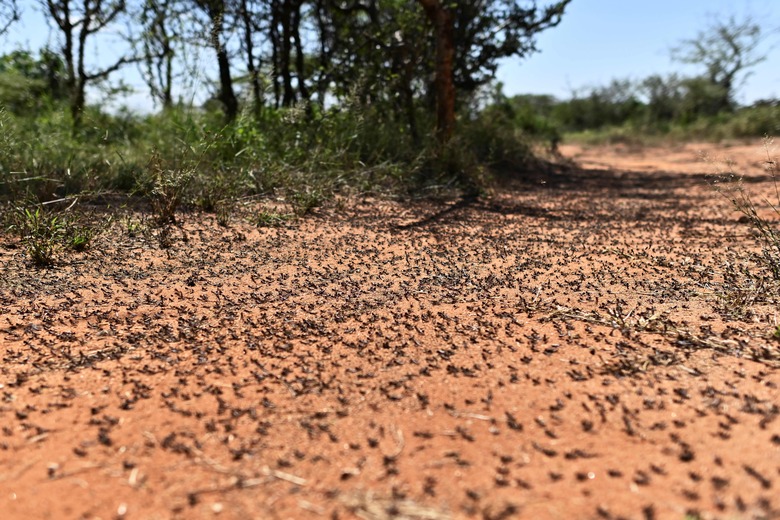A "Plague" Of Locusts Is Overtaking East Africa Right Now
While the world is bracing itself for a coronavirus outbreak, a different kind of infestation is going down in East Africa: desert locusts.
The insects, which look a lot like grasshoppers, are causing chaos in countries including Somalia, Ethiopia, Sudan, Yemen and Kenya. Experts are worried that China, which is already reeling thanks to the coronavirus.
The current outbreak is the worst in decades. The insects have already destroyed hundreds of thousands of acres of crops and show no signs of stopping. In fact, experts are worried it will only get worse — like, 500 times worse — as heavy rains are expected in March, allowing billions more locust larvae to hatch.
Plus, it's hitting areas already dealing with famine and civil war, making it more difficult for some countries to get the resources necessary to fight the swarms or assure the safety of the on-the-ground exterminators. Kenya ran out of pesticides for about a week, and Ethiopia needs funding to secure more plans to spray pesticides. The situation is grim, and the UN is calling on other countries to help the region avoid severe famine and crop destruction.
I Thought Locust Swarms Only Happened in the Bible?
I Thought Locust Swarms Only Happened in the Bible?
It's true that locusts were one of the 10 plagues of Egypt described in the Bible, along with terrible scourges like water turning to blood and three days of darkness. Unfortunately, the swarms have reared their ugly heads outside of the pages of the Bible, too.
In 1875, a whopping 12 trillion locusts descended on the American West in what's now known as the Rocky Mountain locust outbreak. They turned skies black, ate everything in sight, and then, incredibly, that variety of locusts went extinct within about 30 years.
Part of the reason that locusts are so devastating is because they have enormous appetites. They don't carry disease or attack humans, but in a single day, swarms of locusts can travel 100 miles and eat their weight in crops like corn and wheat. Without pesticides to keep them away, acres and acres of crops can be completely wiped out, leaving farmers penniless and people starving.
Why Now?
Why Now?
You might be wondering why, if locusts can do so much damage, you don't hear about these destructive swarms more often. The answer is that conditions have to be just right for the outbreaks to occur, and unfortunately, they are right now.
For years, severe droughts have plagued several areas of East Africa, leading to an already fragile food situation. So the forecast of heavy rains should have been welcome. Instead, though, the rains have brought flash floods and locusts.
Scientists are worried that as ocean temperatures continue to rise, bringing about extreme weather patterns like cyclones that can bring unusually heavy rains to areas of East Africa, terrifying locust swarms will only become more common.
Cite This Article
MLA
Dragani, Rachelle. "A "Plague" Of Locusts Is Overtaking East Africa Right Now" sciencing.com, https://www.sciencing.com/locust-outbreak-in-east-africa-13725302/. 6 March 2020.
APA
Dragani, Rachelle. (2020, March 6). A "Plague" Of Locusts Is Overtaking East Africa Right Now. sciencing.com. Retrieved from https://www.sciencing.com/locust-outbreak-in-east-africa-13725302/
Chicago
Dragani, Rachelle. A "Plague" Of Locusts Is Overtaking East Africa Right Now last modified March 24, 2022. https://www.sciencing.com/locust-outbreak-in-east-africa-13725302/
